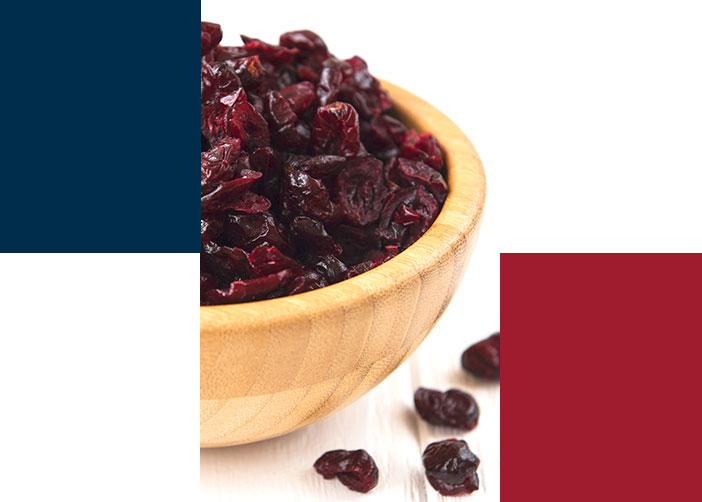
Kavita Devgan
Dietitian, Holistic Health Consultant
and Eminent Writer

Cranberries - a superfood to explore and eat
The pandemic has taught us that it’s time to focus on our health a little more proactively and this is where superfoods come in the picture. Superfoods are foods that deliver nutrients in big amounts, and help us stay healthier and free from disease. They provide the essential compounds that help boost our body’s immune system, and thus help us tackle whatever the universe throws at us.
Cranberry is one such nutrient-dense superfood which delivers essential vitamins and minerals, dietary fibre and multiple other important compounds with numerous potential health benefits.
They are loaded with antioxidants and most of the benefits associated with them come from there. In fact these berries have the highest level of disease fighting polyphenols; grapes come a distant second. They deliver good amount of vitamin C, vitamin K and vitamin E, all extremely effective antioxidants.
These antioxidants give our immunity a fighting chance against the myriad infections going round and are great for our digestive health too. These two benefits are in fact tied together. That is because the polyphenols when metabolised in the body form new bioactive compounds that boost our gastrointestinal health, and that is actually imperative for robust immunity. Cranberries also provide lots of good-for-the-gut fibre, prebiotic fibre, which fuels the probiotics, the beneficial bacteria that are found in the GI tract, which work as the first line of defence for our immune system.
They are particularly high in anthocyanin, compounds that give cranberries their dark red colour, and are known to help cut inflammation form the body and thus reduce our risk of chronic diseases. Anthocyanin help lower blood pressure, protect against liver disease and boost our eyesight too.
The polyphenols present in cranberries may also reduce the risk of cardiovascular disease by preventing platelet build-up and reducing the blood pressure. Plus they help raise the levels of the good cholesterol HDL, which helps keep our heart in the pink. Besides cranberries are low sodium and have nil cholesterol – both check marks for the sake of our heart.
Cranberries role in preventing urinary tract infections (UTIs) is well known. The high level of proanthocyanidins in cranberries help lower the adhesion of certain bacteria to the urinary tract walls, helping thus in fighting off infections. These same compounds also help our oral health by preventing gum disease and bacteria from binding to the teeth.
Ways to eat it
You can get your fix through cranberry juice, or you can eat them raw by just tossing into salads, adding to oats, muffins, your morning bowl of cereal, or blending them into a smoothie. You could make a jelly or sauce and this superfood also pairs beautifully with pork and chicken dishes too. But as raw cranberry has a very tart taste (slightly bitter and sour) that does not go well with everyone they are most commonly had in the dried form where some sugar is added to taper its sour taste.
Ideally fresh or frozen are typically best when it comes to almost any fruit as the drying process concentrates the sugar contained within the fruit but dried cranberries are also a good option specially if you are not on a completely sugar-free diet, as the total amount of sugar in dried cranberries is similar to that of other dried fruit. They can in fact be a better, healthier way to satisfy your sweet tooth specially if they replace other unhealthy desserts. Portion control is of course important and must be adhered to as too much sugar can be bad for anyone.